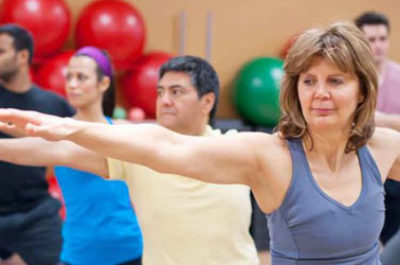
Credit: Next Avenue
6 Things You Didn’t Know About Muscles and Aging
We often rely on age to tell us about ourselves. We consider ourselves physically stronger and more vibrant earlier in life. Medical professionals use age to determine risk for certain diseases, often attributing older age to higher risk. But new research is showing that a person’s biological age is not the key to determining their overall health. It suggests that we should look at other factors, such as mobility, to evaluate a person’s well-being. The findings show that getting older doesn’t have to mean getting weaker. And taking on your health can start with your muscles.
While maintaining your muscles can be more challenging as you get older, science has shown that we can all be strong no matter what age. Here are six surprising things to keep in mind about your muscles and aging — for your 40s, 50s, 60s and beyond.
1. Looking for energy? It may be in your muscles.
You may start noticing muscle loss, or some of its side effects, when you turn 40. At this age, you can start to lose 8 percent of your muscle mass per decade, which translates to roughly 25 percent by the time you turn 70.
Muscle loss can affect your strength and energy levels. One in two Americans 50 years and older who know something about muscle mass are concerned about it as they age, according to a new survey by AARP and Abbott.
2. Muscles are more than just biceps.
Having muscle is more than just strength and how you look on the outside. Muscles play a role in your body’s movement, balance and posture. That’s why when we lose too much muscle, it can cause things like falls or fractures. Muscles also play a role in your metabolism and facial structure and how your body consumes and uses oxygen when you are exercising.
Malnutrition — which is simply not getting the nutrients you need — can affect anyone at any time, but it is more prevalent in older adults
3. Investing in your muscles now can help when times get tough.
If you or a loved one has ever been sick or been in the hospital, you have likely seen or experienced the effect of losing muscle without realizing it due to things like lack of activity, inadequate nutrition or the disease or condition itself.
If your muscles are broken down and weaker, it can be more of a challenge to fight off and recover from a health setback. That’s why muscle health is like a savings account — you must build up a reserve that you can rely on in times of need to help you get back on your feet quicker. Fortunately, there is a surefire way to help keep your muscle health account full, in addition to exercise: proper nutrition.
4. Your diet is directly linked to your muscle health.
We don’t often think of malnutrition as an issue that affects us, but it can play a big part in the health of our muscles. Malnutrition — which is simply not getting the nutrients you need — can affect anyone at any time, but it is more prevalent in older adults.
In fact, one in two seniors are at risk for malnutrition or are malnourished when they are admitted to the hospital, and many are unaware of it. If you are not getting the proper nutrients, your body may rely on proteins found in your muscles. So it’s important to fuel your body with the right nutrients that can help reverse this process.
5. You should eat to build back up.
Though aging, injury and illness can contribute to muscle loss, there are ways to keep healthy and strong. Nutrition is key: a balanced diet of macronutrients like protein and carbohydrates, as well as micronutrients like vitamins and minerals, can benefit overall health, including the health of your muscles.
Protein-rich foods such as meat, eggs and cheese can help rebuild your muscles. In the same AARP-Abbott survey, less than 20 percent of people knew how much protein they even need. To put it into perspective, a 150-pound healthy adult needs about 53 grams of protein a day. But research has recommended that older adults take in almost two times this amount to help preserve their muscle mass.
Other muscle-preserving nutritional ingredients include amino acids like leucine and its metabolite HMB (beta-hydroxy-beta-methylbutyrate), which play a key role in your muscle health. HMB works with protein to help preserve and protect muscles. Your body naturally produces it when you consume protein-rich foods such as meat or dairy products. But with age, the natural levels decrease, according to new research.
6. Nourish your body on the road to recovery.
Similar to needing oxygen to breathe, you need to nourish your muscles to stay strong and healthy, particularly if you face an illness. A recent study I took part in showed that the use of a specialized high-protein nutrition drink, with HMB and Vitamin D, was associated with a 50 percent lower risk of death in malnourished adults 65 years or older hospitalized with a heart or lung disease, compared to the group who received a placebo.
That’s another reason why it is important to get the right nutrition as you get older. It can help you live longer and rebound more quickly from life’s ups and downs. Keep nutrition, along with exercise, top of mind as you age to stay vibrant, healthy, and strong.
(Disclosure: Hegazi is employed by Abbott Nutrition, which supported the research he cites above involving use of a high-protein nutrition drink.)
